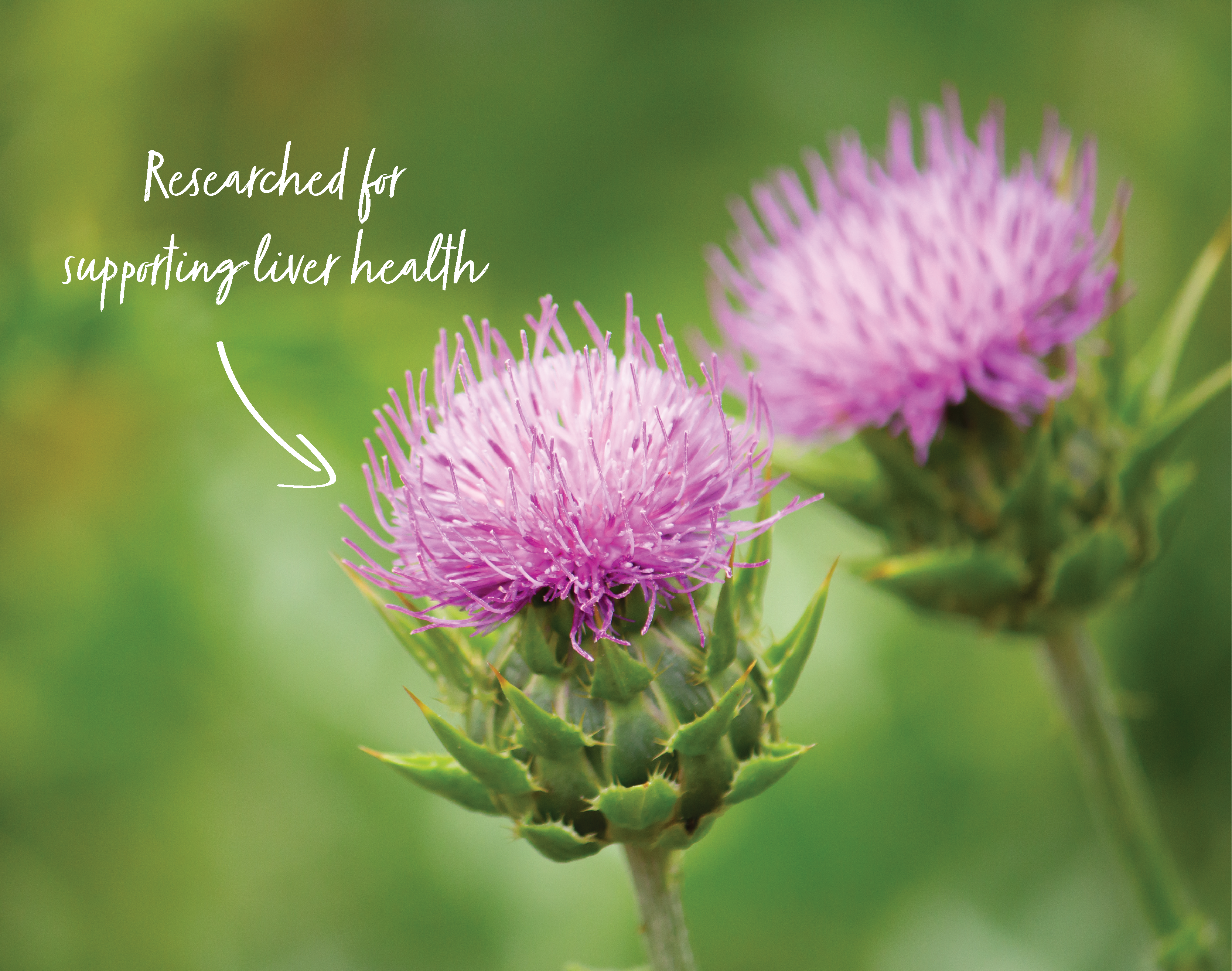Milk thistle may offer benefits for liver conditions, cancer support, and diabetes management. However, evidence remains limited and some studies have methodological weaknesses, making definitive conclusions difficult.
Milk thistle is an herbal remedy obtained from the milk thistle plant, botanically known as Silybum marianum.
This spiny plant features purple blooms and white-veined leaves — a pattern folklore attributes to a drop of the Virgin Mary’s milk landing on the foliage.
The plant’s active compounds are a collection of phytochemicals collectively called silymarin.
The therapeutic preparation is often sold as milk thistle extract, which contains concentrated silymarin derived from the plant.
Silymarin isolated from milk thistle has demonstrated antioxidant, antiviral and anti-inflammatory actions.
Traditionally it has been used for liver and gallbladder issues, to increase breast milk production, to help prevent and treat cancer, and even to protect the liver from toxins such as alcohol, environmental poisons, and venom from snakebites.
Below are seven science-based benefits associated with milk thistle.

1. Milk thistle supports liver health
Milk thistle is commonly promoted for its liver-protective qualities.
People frequently use it as an adjunct treatment when they have liver injury from conditions like alcoholic liver disease, nonalcoholic fatty liver disease, hepatitis, and sometimes liver cancer.
It’s also used to shield the liver from poisons such as amatoxin, the deadly toxin found in death cap mushrooms.
A 2021 study reported improvements in liver function among individuals with nonalcoholic fatty liver disease who took a milk thistle supplement, suggesting potential to lessen liver inflammation and damage.
While the exact mechanisms remain to be fully clarified, milk thistle is believed to reduce liver injury caused by free radicals, which are generated when the liver processes harmful substances.
Some research has also suggested it might modestly increase survival in people with alcohol-related cirrhosis.
However, results across studies have been inconsistent, and not all trials have demonstrated a clear benefit of milk thistle extract for liver disease.
Consequently, further research is necessary to determine the optimal dosing and duration of treatment for specific liver disorders.
And although milk thistle extract is commonly used alongside conventional care for liver conditions, there is no current evidence that it can prevent these diseases, particularly if unhealthy lifestyle factors are present.
2. It may help prevent age-related cognitive decline
For over two millennia, milk thistle has been used in traditional medicine for neurological disorders like Alzheimer’s and Parkinson’s disease.
Thanks to its anti-inflammatory and antioxidant properties, it may offer neuroprotective benefits and help slow age-related declines in brain function.
In older animal models, silymarin has been shown to prevent oxidative damage to brain cells, which could help preserve cognitive abilities.
These experiments also indicated that milk thistle may reduce the accumulation of amyloid plaques in the brains of animals modeling Alzheimer’s disease.
Amyloid plaques are sticky aggregates of amyloid proteins that accumulate between neurons with age.
They are abundant in the brains of people with Alzheimer’s, so milk thistle could potentially have a role in managing this challenging disease.
However, there are currently no clinical trials in humans assessing milk thistle’s effects in Alzheimer’s or other neurodegenerative diseases such as dementia or Parkinson’s.
Additionally, it’s uncertain whether milk thistle is absorbed well enough in humans to cross the blood–brain barrier in therapeutic amounts, or what doses would be required for benefit.
3. Milk thistle may support bone health
Osteoporosis is characterized by gradual bone loss over time.
It typically develops slowly and leads to fragile bones that fracture easily, even from minor falls.
Experimental animal research has shown that milk thistle can stimulate bone mineralization and may help protect against bone loss.
As a result, researchers have suggested milk thistle could be a beneficial therapy to prevent or slow bone loss in postmenopausal women.
However, human studies are lacking, so its real-world efficacy remains uncertain.
4. It may enhance cancer therapy
A 2023 study reported that the antioxidant actions of silymarin can trigger anti-tumor responses and protect healthy cells from chemotherapy-induced harm.
A review of animal studies indicates milk thistle might reduce some adverse effects of cancer treatments.
It may also potentiate chemotherapy against certain cancers and, in some contexts, directly induce cancer cell death.
However, older human trials have been limited and have not yet demonstrated a clear clinical benefit.
This may stem from poor absorption in people, preventing sufficient levels from being reached to exert medicinal effects.
More rigorous human trials are needed to clarify how silymarin could be used to support patients undergoing cancer treatment.
5. It can increase breast milk production
One reported benefit of milk thistle is stimulating breast milk production in nursing mothers, possibly by increasing levels of the milk-producing hormone prolactin.
Evidence is sparse, but a trial found that mothers taking 420 mg of silymarin for 63 days produced 64% more milk than those on placebo.
However, this is the only clinical trial published. Further research is required to confirm these findings and to ensure safety for breastfeeding mothers.
6. It could help treat acne
Acne is a chronic inflammatory skin disorder. Although not life-threatening, it can lead to scarring and emotional distress.
Oxidative stress may contribute to acne development.
Given its antioxidant and anti-inflammatory effects, milk thistle might be a helpful supplement for those with acne.
For example, one 2012 study reported that individuals taking 210 mg of silymarin daily for 8 weeks experienced a 53% reduction in acne lesion counts.
Yet, as this is a solitary study, higher-quality trials are necessary to confirm these results.
7. Milk thistle can lower blood sugar in people with diabetes
Milk thistle may be a useful adjunct for managing type 2 diabetes.
Research suggests one compound in milk thistle may act similarly to some antidiabetic drugs by improving insulin sensitivity and reducing blood glucose.
Indeed, the same 2021 systematic review and meta-analysis reported that regular silymarin users had significant reductions in fasting blood glucose and HbA1c, a marker of long-term glucose control.
Additionally, milk thistle’s antioxidant and anti-inflammatory effects might help lower the risk of diabetic complications such as kidney disease.
However, the review also noted that study quality was generally low, so further high-quality trials are required before firm recommendations can be made.
Is milk thistle safe?
Oral milk thistle is generally regarded as safe for most people.
Reported side effects are usually gastrointestinal, such as diarrhea, nausea, or bloating.
Certain groups should exercise caution when using milk thistle, including:
- Pregnant women: There is insufficient safety data in pregnancy, so it is typically recommended they avoid the supplement.
- People allergic to related plants: Those allergic to the Asteraceae/Compositae family may experience allergic reactions to milk thistle.
- People with diabetes: Milk thistle’s glucose-lowering effects could increase the risk of hypoglycemia in people on diabetes medications.
- Individuals with hormone-sensitive conditions: Milk thistle can have estrogen-like effects, which might exacerbate hormone-sensitive disorders, including certain breast cancers.
Bottom line
Milk thistle appears to be a relatively safe supplement that shows promise as an adjunct therapy for various conditions, including liver disease, cancer support, and diabetes.
Nevertheless, many studies are small and have methodological limitations, which prevents definitive guidance about its use or confirmation of its benefits.
Overall, better-quality research is needed to establish effective doses and clinical roles for this intriguing herb. Consult your physician or a qualified healthcare professional before starting any herbal supplement.

























Leave a Reply
You must be logged in to post a comment.